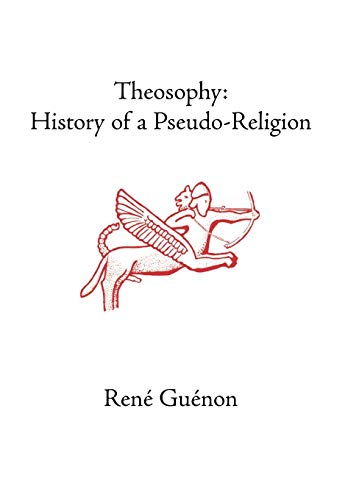Theosophy: History of a Pseudo-Religion (Collected Works of Rene Guenon)
Guenon, Rene; Wetmore, James Richard
Verkäufer
BooksRun, Philadelphia, PA, USA
Verkäuferbewertung 5 von 5 Sternen
![]()
AbeBooks-Verkäufer seit 2. Februar 2016
Beschreibung
Beschreibung:
It's a well-cared-for item that has seen limited use. The item may show minor signs of wear. All the text is legible, with all pages included. It may have slight markings and/or highlighting. Bestandsnummer des Verkäufers 0900588802-8-1
Inhaltsangabe:
Since the late nineteenth century, the Theosophical Society has been a central force in the movement now known as the New Age. Just as the Communist Party was considered ’old hat’ by peace activists in the ’60s, so the Theosophical Society was looked upon by many in the ’spiritual revolution’ of those years as cranky, uninteresting, and passé. But the Society, like the Party, was always there, and-despite its relatively few members-always better organized than anybody else.Since then, the Society’s influence has certainly not waned. It plays an important role in today’s global interfaith movement, and, since the flowering of the New Age in the ’70s, has established increasingly intimate ties with the global elites. And its various spinoffs, such as Elizabeth Clare Prophet’s Summit Lighthouse, and Benjamin Crème’s continuing attempt to lead a ’World Teacher Maitreya’ onto the global stage-just as the Society tried to do in the last century with Krishnamurti-continue to send waves through the sea of ’alternative’ spiritualities.Guénon shows how our popular ideas of karma and reincarnation actually owe more to Theosophy than to Hinduism or Buddhism, provides a clear picture of the charlatanry that was sometimes a part of the Society’s modus operandi, and gives the early history of the Society’s bid for political power, particularly its role as an agent of British imperialism in India. It is fitting that this work should finally appear in English just at this moment, when the influence of pseudo-esoteric spiritualities on global politics is probably greater than ever before in Western history.
Reseña del editor: Since the late nineteenth century, the Theosophical Society has been a central force in the movement now known as the New Age. Just as the Communist Party was considered 'old hat' by peace activists in the '60s, so the Theosophical Society was looked upon by many in the 'spiritual revolution' of those years as cranky, uninteresting, and passé. But the Society, like the Party, was always there, and-despite its relatively few members-always better organized than anybody else. Since then, the Society's influence has certainly not waned. It plays an important role in today's global interfaith movement, and, since the flowering of the New Age in the '70s, has established increasingly intimate ties with the global elites. And its various spinoffs, such as Elizabeth Clare Prophet's Summit Lighthouse, and Benjamin Crème's continuing attempt to lead a 'World Teacher Maitreya' onto the global stage-just as the Society tried to do in the last century with Krishnamurti-continue to send waves through the sea of 'alternative' spiritualities. Guénon shows how our popular ideas of karma and reincarnation actually owe more to Theosophy than to Hinduism or Buddhism, provides a clear picture of the charlatanry that was sometimes a part of the Society's modus operandi, and gives the early history of the Society's bid for political power, particularly its role as an agent of British imperialism in India. It is fitting that this work should finally appear in English just at this moment, when the influence of pseudo-esoteric spiritualities on global politics is probably greater than ever before in Western history.
Bibliografische Details
Titel: Theosophy: History of a Pseudo-Religion (...
Verlag: Sophia Perennis et Universalis (edition )
Erscheinungsdatum: 2004
Einband: Hardcover
Zustand: Very Good
Beste Suchergebnisse beim ZVAB
Theosophy: History of a Pseudo-Religion (Collected Works of Rene Guenon)
Anbieter: Ria Christie Collections, Uxbridge, Vereinigtes Königreich
Zustand: New. In. Artikel-Nr. ria9780900588792_new
Anzahl: Mehr als 20 verfügbar

